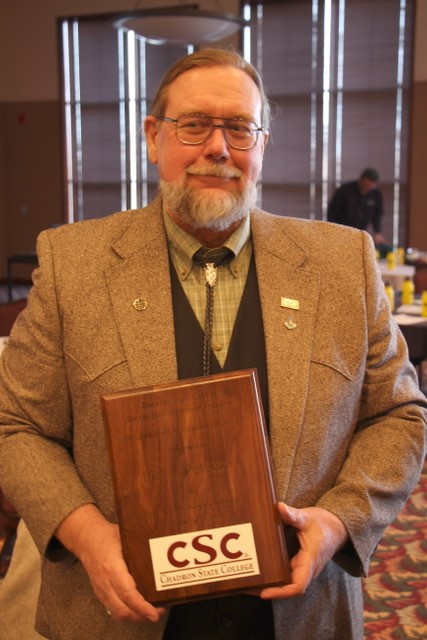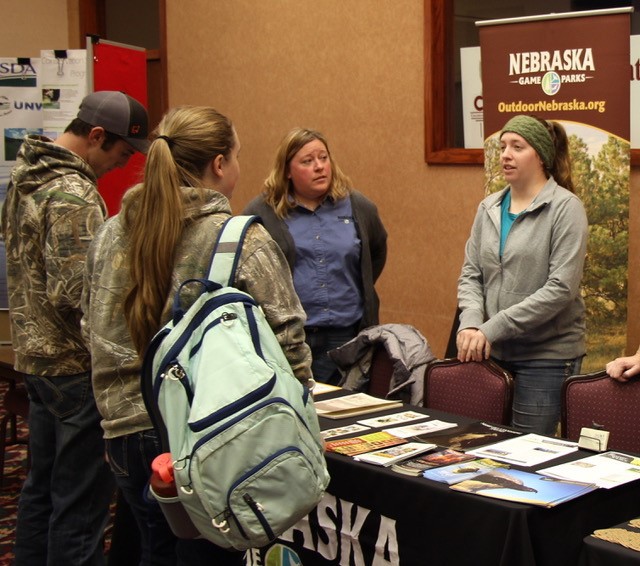Range Day speakers offer rangeland management insights

CHADRON – Scientists, ranchers and Chadron State College students shared insights on a variety of topics related to management practices for rangeland at the Upper Niobrara White Natural Resource District (UNWNRD) Range Day event Thursday at the Student Center.
The Range Day event was sponsored by the CSC Rangeland Management Program and the C.F. Coffee Gallery, with support from the Bill and Virginia Coffee Family Foundation. Thursday’s event also included the presentation of the 2016 CSC Range Management Alumni Achievement Award to Rick L. Peterson, who was the first person to receive a range management degree from CSC in 1993.
Peterson, who came to CSC after working for several years as a meat cutter, credited hard work, perseverance and interest, as well as encouragement from CSC faculty members including Jim O’Rourke, Ron Weedon and Joyce Hardy for his success at school and in his career.
“This is a great place to attend classes,” said Peterson, who has had top range management positions with the Natural Resource Conservation Service (NRCS) in South Dakota and Wyoming, and now works on ecological site inventories in a five state area for the NRCS office in Rapid City, S.D.
The UNWNRD’s first Range Day in 2016 focused on measures to combat cheatgrass, an invasive plant that is largely unpalatable to cattle and can increase fire danger on grasslands, said Nevin Price, a 2013 CSC range management graduate and the NRD resource technician who organized the event.
Chadron State is an ideal location for holding Range Day, in part because of the variety of landscapes in the northern Panhandle, said Price.
“There is so much difference in range and ecosystems out here, we can cover every topic and have a place to go look at it,” he said.
Price also praised CSC’s Rangeland Management program.
“I had a lot of friends that attended other programs and they came here and said this is by far the best,” said Price. “It’s a real awesome program.”
This year’s event included a brief update on cheatgrass and speakers on a broad range of topics to give local producers ideas on different management styles, said Price.
Presentations by three Nebraska ranchers, John Maddux, Chip Ramsay and Nancy Peterson, provided insights into some of the management strategies used by successful producers.
Maddux offered a detailed look at the economics of corn stalk grazing in winter, supplemented with wet distiller’s grain, for a yearling cattle operation in southwest Nebraska’s Chase County. Maddux said his family decided to focus on yearlings in order to add value to their calves, but not compete with the over-capitalized feeding sector of the livestock industry.
Ramsay, who oversees several units of the Rex Ranch in the Sandhills near Alliance, said a core management strategy of his operation is limiting overgrazing through disciplined grazing plans.
“I run large herds for short duration on pastures,” he said. “We feed two crops-the animals and the microbes in the soil.”
A focus on soil health through no-till farming, diverse crop rotation, and rotational grazing have paid off in productivity, said Peterson, who ranches the Plum Thicket Farms south of Gordon with her husband and son.
“In a very short period you can significantly change the health of your soil,” Peterson said.
Wyoming-based private meteorologist Don Day offered the audience of more than 100 people some insights on long range weather forecasting in his presentation. The Pacific Ocean exerts major influence on climate in the High Plains region, said Day, and current readings show the ocean in a weak La Nina pattern of colder-than-normal surface temperatures.
“When the Pacific is cold, we are generally in this part of the world going to be drier than normal,” said Day, adding that, because the pattern is weak, the year will likely see closer to average temperature and precipitation levels. “You don’t have a significant drought signal.”
Other topics addressed at Range Day included grazing in timber lands, how fire can be used to impact grazing patterns, management of invasive red cedar trees on range lands, and restoration of prairie lands in Nebraska.
The day-long event concluded with presentations of research work by Chadron State College range management students Jacob Tejral and Jedidiah Rice. Tejral spoke of his work addressing problems on family grazing land he manages near Lincoln, while Rice used statistics to show that heavier cattle weights may have a negative effect on net ranch income.
The two seniors will present their work at the national Society for Range Management conference in St. George, Utah, at the end of January.
Category: Campus News

